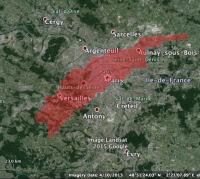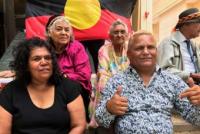Australia’s Labor party opposition will join the one-seat-majority conservative government to limit indigenous land rights in order to protect mining deals. The move angers traditional indigenous land owners fighting Australia’s proposed biggest coal mining project adjacent to the Great Barrier Reef in central-western Queensland. The Wangan and Jagalingou traditional owners, struggling against the 200-square-kilometre mine planned by the corruption-tainted Indian transnational Adani behemoth, accuse Labor of “lining up with the government” to wind back their rights.
Senior spokesperson for the Wangan and Jagalingou Traditional Owners Council, Adrian Burragubba said, “Labor has lined up with the Government to wind back our rights – and their own commitment to land rights. They have swallowed the arguments of the mining and agricultural lobby that there is a crisis that needs an urgent response.”
Burragubba wrote on a CommunityRun petition that more than 3,500 people had contacted political party leaders “to put the handbrake on George Brandis’ cheap-ploy to overthrow our native title rights”.
“But Labor has betrayed us. As we feared, they have broken faith with a long tradition of defending native title and abandoned our right to self-determination. Labor makes out that they have done a good thing and fought the Government. But the truth is they are set to back the changes the Government wants.
“Right now, there’s an extra reason we can influence Labor. The United Nations Special Rapporteur on the Rights of Indigenous Peoples, Vicky Tauli-Corpuz, is in Australia. If we can show Labor that the UN is watching, they’ll have to think long and hard before capitulating to the Government and abandoning our rights.
“For too long the native title regime has been used to benefit everyone else but the Traditional Owners. The spirit of the original Mabo decision has long been betrayed - and the slow administrative death of our rights is nearly all but complete.
“Even when we strike a blow for self-determination and the integrity of our laws and customs - like the Noongar appellants did, and like we have against Adani's mine of mass destruction - the mining councils and agricultural lobbies rally. They push the major parties into winding back the vestige of land rights that we have.”
Last month the federal court ruled that an Indigenous Land Use Agreement (ILU) in Western Australia was invalid because not all entitled Indigenous representatives had signed it. Previously such agreements didn’t need all claim group representatives on board if a majority of the broader clan or claim group voted in support.
The court ruling sent shockwaves through the mining industry, putting in doubt large-scale mining projects that rely on ILUAs signed only by a majority of a claim group.
The mining-addicted and funded government moved quickly to amend the Native Title Act to ensure all pre-existing ILUAs are still enforceable.
With the two major political camps now agreed on cutting indigenous rights by clearing the way for Adani to ignore indigenous objections to the proposed mine, the Wangan and Jagalingou opponents to it are to meet with the United Nations Special Rapporteur on Indigenous Peoples Rights to express their concern.
I can’t see that move achieving much because Australia has a record of ignoring UN decisions it dislikes, although it’s signed up to them, notably on refugees and indigenous rights.
If the mine goes ahead it could destroy the Great Barrier Reef, which is under UN heritage protection, is one of Australia’s main tourist attractions and a major generator of jobs.
The Adani Group is facing growing pressure to reveal which company in its complex corporate web has applied for an AUD1 billion subsided loan from the Australian government, amid fears that money could be shifted to a tax haven and investors may have been misled.
An Australian law firm has written to the Bombay Stock Exchange asking it to clear up the confusion about a $1 billion funding application to the Federal Government's Northern Australia Infrastructure Facility (NAIF).
The loan would finance a 400-kilometre railway from six open-cut pits and five underground collieries to port for shipment to India.
As these moves were unfolding, an alliance of 13 green groups has formed to fight the mine, claiming to be the biggest green movement ever in Australia. It comprises the Bob Brown Foundation, 350.org, GetUp, Australian Conservation Foundation, Australian Youth Climate Coalition, Seed (Australia’s first Indigenous youth climate network), Australian Marine Conservation Society, Mackay Conservation Group, North Queensland Conservation Council, Environment Council of Central Queensland, Whitsundays Residents Against Dumping, Market Forces and The Sunrise Project.
A prominent figure in it is veteran campaigner, Bob Brown, whose leadership largely influenced protests that stopped a huge dam planned for the southernmost state of Tasmania. That protest spawned the Australian Greens party and Brown went on to become a prominent Senator in the national parliament.
The Stop Adani Alliance cites new polling that shows three-quarters of Australians oppose subsidies for the mine when told the government plans to lend its owners $1bn.
The alliance’s declaration argues the mine will “fuel catastrophic climate change” because burning 2.3bn tonnes of coal from the mine over 60 years of operation would create 4.6bn tonnes of carbon dioxide.
It states the project would “trash Indigenous rights”, citing the fact that Adani does not have the consent of the Wangan and Jagalingou people.
“Adani and the federal government have no idea of the scale of opposition and voter backlash they’re facing — it is time for them to withdraw approvals for the mine and stop coal for good,” Brown said.
The Adani group has an appalling record including bribery, environmental vandalism, corruption and money laundering in its other overseas activities.
While the Australian government still wants to subsidise a mine that scientists say will kill the Great Barrier Reef, the number of new coal plants being built around the world dropped sharply in 2016, with the shift away from coal being led by two of the planet’s largest carbon emitters – China and India – a new report has found.
Australia is already the world’s largest exporter of coal, accounting for 36% of global coal exports in 2015.
Previous coverage:



Birthday surprise for Westpac bank
They brought this meeting forward, not so they could talk to us about their Sustainability Report, but so they could work out what we had planned for the campaign and for their 200 year anniversary...
But we didn’t tell them. Instead we’re going to give them the surprise of their lives. Chip in now to give Westpac the gift of 200 creative actions for their 200 year anniversary.
To show them we mean business, we need to take our campaign to the next level. Already we’ve got volunteers talking to Westpac staff every day across the country. Now we need to take it to the next level.
I can’t tell you too much about the strategy - they’ve probably signed up to our emails, too. But we’ve tested it out before on CommBank and won. We’ll put up billboards, cheeky videos, stickers, stunts, projections, everything you can imagine that will scare the pants off Westpac and their precious “sustainability reputation.”
Westpac are already very nervous about our campaign. If we can ramp up the pressure on their brand, their staff and their board of directors, we can force them to rule out funding Adani, and move away from fossil fuels for good.
Your support, along with that of thousands of AYCC supporters and our friends in the movement, will stop Adani from getting the money they need to build their dangerous coal mine. You can donate here to help us lock in our secret people-powered surprise for Westpac.
Happy birthday, Westpac...
Yours in power,
Kirsty on behalf of the Australian Youth Climate Coalition team
‘Treaty is unfinished business’ 4 First Nations women argue
Four First Nations women from across the country came together in Redfern, Sydney, this week for the ‘Young Women Speak out for Treaty’ forum to discuss why we need a treaty, why it’s important, and how to bring it to life.
The audience sat in the room mesmerized, as Lynda, Amelia, Natalie and Lidia took the stage at the Redfern Community Centre. The four eloquent women were there for the ‘Young Women Speak out for Treaty’ forum, organized by the Stop the Intervention Collective Sydney.
Their speeches wove emotional personal stories with those of their families, offering a backdrop to their powerful, yet softly-spoken arguments about why they believe a treaty would benefit Australia’s First Nations peoples, more so than constitutional recognition.
Click here for the full story on National Indigenous Television.
Secretive activist network planning Australia-wide direct action
Across Australia a secretive network of activists are laying the groundwork for what they expect will be the biggest environmental protest movement in the country’s history.
Standing idly by on the assumption that the economics of the massive coal projects won’t stack up – at a time the world is trying to reduce carbon emissions to limit global warming to under 2C – is not a choice these activists are willing to make.
And so the campaign to take the fight against Adani’s proposed mine beyond the courts and into civil disobedience, is under way.
Behind a Galilee Blockade campaign is a core group of activists well versed in the “security culture” required of those intending to jam a serious monkey wrench into a major industrial project.
This describes the kind of precautions people take when there’s a very real prospect that arrests and charges will follow, as well as police surveillance and leaks that could tip off direct-action targets.
They share strategy via encrypted messaging. When meeting to talk specific action, phones are left out of the room.
Read the full Guardian story by clicking here.